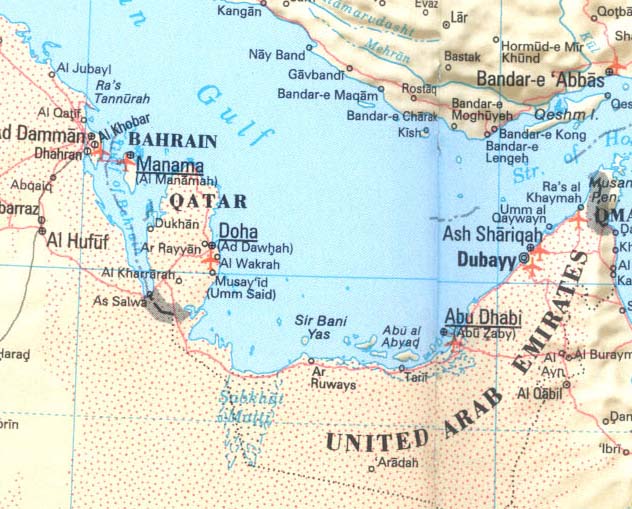
Today’s issue of the Qatar Tribune (Nov. 5, 2007) had a few stories of interest to me although I don’t expect them to appear in the New York Times. Interestingly the first probably should. It is an interview conducted by editor-in-chief of the paper, Dr. Hassan Mohammed al Ansari, with Crocker Ryan, current US ambassador to Iraq, who was in Doha just a week ago. You may recall that as a young diplomat he spend some years in the 1970s in Qatar, then a very different place. He replied, when asked what brought him back,
“to talk about Iraq. We’re seeing some significant positive changes in the country. I’m here to give my evaluation, seek Qatar’s perspective and consider how we, Qatar and other regional states might cooperate to encourage progress. Qatar is an important country. It has been a good partner of the US over the years. Our consultation would certainly benefit me in my mission, and perhaps be of use to the government of Qatar as well. What happens in Iraq is extremely important – not just to the Iragis, but also to Qatar, the region and the US. … My assessment is that it is possible to conduct diplomatic activity in Baghdad in reasonable security. Also, this is the time to do it. I have found that our Arab friends are very concerned about what is going on. Qatar has a special role to play in this. The GCC [Gulf Cooperative Council] summit in Doha next month might be an occasion for these countries to take another look at Iraq – not just in bilateral terms but collectively as the GCC.”
Further questions and answers in the interview concerned the likelihood of war in Iran, something the editor says the region fears. Crocker responded that the US is not seeking a military action, that they have gone to the UN Security Council for two resolutions and working with others in the region to change Iran’s behavour with respect to Iraq, its nuclear programme and supporting terrorists.
Another piece in the same paper announced that Qatar is ready to fund and manage Yemen’s archaeological projects, a project of personal interest to me. At a two-day international conference on Qatar International Archaeology Project in Yemen (QIAPY), sponsored by the Qatar Museums Authority (QMA), the effort to explore the rich history of Yemen and its ancient kingdoms was discussed. The project was initiated during a visit of the Emir His Highness Sheikh Hamad bin Khalifa al Thani to Yemen. The conference in Doha was attended by a large number of international archaeologists, historians and geologists. In response to the question of why the conference is in Doha but the project in Yemen, the vice president of the QMA said that the plans for exploration in Yemen were one of a number; others are in process for Syria and Sudan.
Another piece in the same paper announced that Qatar is ready to fund and manage Yemen’s archaeological projects, a project of personal interest to me. At a two-day international conference on Qatar International Archaeology Project in Yemen (QIAPY), sponsored by the Qatar Museums Authority (QMA), the effort to explore the rich history of Yemen and its ancient kingdoms was discussed. The project was initiated during a visit of the Emir His Highness Sheikh Hamad bin Khalifa al Thani to Yemen. The conference in Doha was attended by a large number of international archaeologists, historians and geologists. In response to the question of why the conference is in Doha but the project in Yemen, the vice president of the QMA said that the plans for exploration in Yemen were one of a number; others are in process for Syria and Sudan.
“The Qatari programme in Yemen aims at discovering and preserving the important archaeological sights in Yemen and the social and economic development of Yemen by boosting opportunities for tourism. The programme includes the excavation of archaeological sights that have the potential to fetch Yemen a considerable amount of foreign reserves. The ancient kingdoms of Yemen were the first ancient civilizations of the Arabian Peninsula. … The focus of the experts is not only discovering the rich ancient cultural heritage of Yemen but also preserving it from irreversible loss.”
Finally, I cite two more obscure, but not less important, initiatives reported in the same paper: Qatar, Belgium sign farm agreement, reports that both countries seek to enhance technical and economic collaborations in the field of agriculture, livestock and municipal affairs. This, they report, “includes supervision programs of nutrition materials and countering the threat of pest.” And Rwanda seeks Qatar’s help for charitable activities, reported a meeting between the Chairperson for the Qatar Authority for Charitable Activities, Adhmad bin Mohamed al Muraikhi, and Sheikh Saleh Habib Habimana, the Mufti of Rwanda. They discussed how to reinforce cooperation between the two countries. The Mufti acknowledged Qatar’s role in extending humanitarian assistance to the country and said that Islam had set its foot in Rwanda in the late 19th century, with the first mosque built in 1913.
Finally, I cite two more obscure, but not less important, initiatives reported in the same paper: Qatar, Belgium sign farm agreement, reports that both countries seek to enhance technical and economic collaborations in the field of agriculture, livestock and municipal affairs. This, they report, “includes supervision programs of nutrition materials and countering the threat of pest.” And Rwanda seeks Qatar’s help for charitable activities, reported a meeting between the Chairperson for the Qatar Authority for Charitable Activities, Adhmad bin Mohamed al Muraikhi, and Sheikh Saleh Habib Habimana, the Mufti of Rwanda. They discussed how to reinforce cooperation between the two countries. The Mufti acknowledged Qatar’s role in extending humanitarian assistance to the country and said that Islam had set its foot in Rwanda in the late 19th century, with the first mosque built in 1913.



